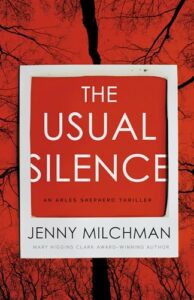Series Debut
 It’s been awhile since Jenny Milchman had a new book out (The Second Mother, 2020) but her brand of feminist, almost gentle, thrillers are always appealing and difficult to put down once you’ve started reading one. Her new book is the launch of a series featuring Dr. Arles Shepherd, a therapist who, as the book opens, is in disgrace. She’s been fired from her job as she appears to have huge gaps in her memory, one of which happened during a session with a client.
It’s been awhile since Jenny Milchman had a new book out (The Second Mother, 2020) but her brand of feminist, almost gentle, thrillers are always appealing and difficult to put down once you’ve started reading one. Her new book is the launch of a series featuring Dr. Arles Shepherd, a therapist who, as the book opens, is in disgrace. She’s been fired from her job as she appears to have huge gaps in her memory, one of which happened during a session with a client.
Arles also has an ailing stepfather suffering from dementia, and when she visits, it’s clear there’s some kind of bad emotional backstory, and that he’s hung on to a family property that belongs to her. She plans to take over the property and turn it into a therapeutic immersive camp for families. It’s also clear she’s had a long obsession with a certain photograph, and she’s just found the identity of the person in the photo. Part of the reason for her therapy camp is the woman in the photo, who happens to have an autistic son. She’s a perfect fit for the camp.
Arles heads to upstate New York, where the camp is located, and finds she has much to do to get the place ready. She finds squatters in the basement – a mother and daughter – and quickly hires the mother as a cook and assistant. This was the “Cinderella” part of the book, and I was all for it, but of course there are many deeper themes which begin to come to the fore as her patients arrive.
Arles’ concept of immersive family therapy involves the entire family, and the issues of everyone in the family, not just the “sick” one. One of her first families is that of an anorexic patient she had been treating at her old job, and the other is a couple recently escaped from a church cult. And she’s awaiting Louise, the woman in her photo, and her autistic son, Geary. Arles suspects there’s something off about Geary’s diagnosis.
While some of the therapy parts of the book are among the strongest threads, there’s another very strong thread, and that’s the power and agency of women characters. Parallel to the story of Arles and Louise is the disappearance of 12-year-old Bea, who vanished on her way home from school one day. Her distraught parents are one tick away from total collapse, and the only thing keeping her dad going is when two true crime podcasters tell him they’ve been following the case, and that Bea is “a blade sheathed in silk”. What they mean is that she’s tough and smart, and they walk him through why they think that way. It’s his only nugget of hope.
Throughout the book, Arles reminds herself to use her voice, to be strong, to tell what she knows, and she tells her patients the same. One of the best scenes involves the man-splaining dad of the anorexic girl. Arles ultimately tells herself: “she wouldn’t impose on herself the blame for one more man’s evil. No woman should ever do that.” While Arles talks the talk she doesn’t always walk the walk. She does have her own issues to work through, some tied to the very house where she’s chosen to set her family camp.
The suspense part of the book tightens up toward the end as the various threads of the story begin to come together in very unexpected ways. This is a psychological thriller in every sense of the word as the crime is solved by the actual psychology of the people involved. This is a compelling read and made me very glad Milchman has returned pen to paper. — Robin Agnew